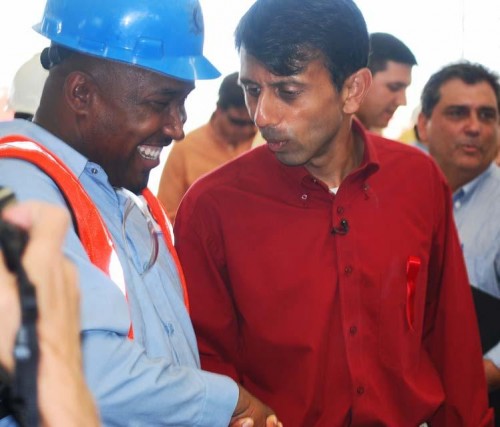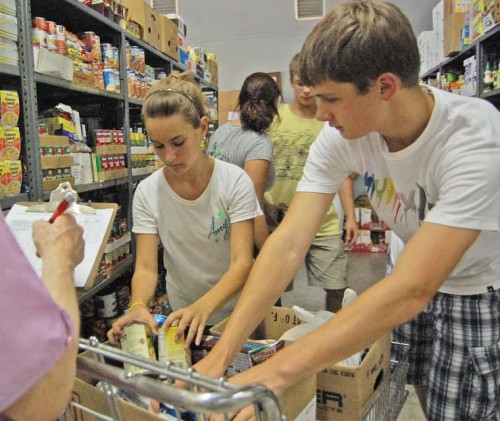
Drilling freeze has chilling impact
June 16, 2010Rose Stewart
June 18, 2010“Clink, clank, clink, clank.”
The sound of cans fighting for shelf space is promising. For some, they’re an auspicious light at the end of a long, dark tunnel. For others, they’re merely a means of survival.
During the summer months, from June through August, area food banks are typically pounded. Children are home from school and “the pantries just don’t stay full,” explained Jermaine Jackson, director of social services for Catholic Charities.
About 25 extra families visit the Good Samaritan Food Bank in Houma during those months, said Reynold Pitre, the organization’s manager. The location in Raceland, a much smaller community, sees about 10 to 15 additional families.
“Good Samaritan’s” in Raceland served more than 1,200 individuals and 500 families last year, noted Jackson. The average, she said, is about 45 families a month.
With the tight squeeze, many fear the oil spill in the Gulf of Mexico could increase the pressure on local facilities, as more people are laid off and hours are cut. But so far, that hasn’t happened, according to Jackson. And if it has, it’s been unnoticed.
The Good Samaritan Food Bank, which also has locations in Thibodaux and Raceland, has helped provide struggling individuals – anywhere from 125 to 150 families a year – a means of subsistence. But today, its worth is increasing with every passing second. Now, a region that once prided itself, and still does, on its lively reputation in the oil and gas industry is facing hardship for that very reason.
With federal policymakers, mainly affiliated with the Obama administration, keeping a closed fist on the Gulf since an oil spill on April 20, drilling activities have diminished.
For generations that have worked in the industry, some since the ripe age of 18, getting a different type of job will be hard to come by. Their focus has been narrow, and for good reason, as oil and gas workers can muster up healthy earnings with just a few years experience. In talking with locals, opportunities outside of this realm are few and far between. And in most instances, the pay and benefits aren’t enough.
BP, the company responsible for what experts have referred to as one of the world’s greatest environmental disasters, is striving to make things right. But in a nation that loves to live fast and furious, time is something most people, and businesses, don’t have.
So far, the company has employed multiple attempts to stop the crude. All have been unsuccessful in plugging the leak. A relief well – the company’s sure-fire solution to permanently fixing the problem – is still weeks away. Even then, it’s not clear whether activities in the Gulf will resume as normal, or if things will be slow to takeoff.
For relief agencies, charity organizations and volunteers, that means work could get demanding. Those who are OK now, may not be tomorrow. Stormy weather – atypical to the dark clouds that usually hang overhead on hot summer afternoons – is approaching. When it hits is anyone’s guess.
Busy away from work
Boxes and cans lining the small shelves at the food bank in Houma are lifesavers – not the savory morsels you can find at the nearest 7-Eleven. They’re much more important than that.
The building on 254 Magnolia St., more like a warehouse than a storefront, looks similar to a beehive this time of year, bustling with activity during the blocks of time when its doors are open. Since volunteers spearhead most of the facility’s operations, its hours are limited.
On a recent Wednesday evening, a handful of local students helped fill more than 15 orders in a four-hour span. According to the small group of volunteers sitting in a circle of chairs, that was a small showing.
Beads of sweat began to form on the students’ foreheads as they struggled to keep up – “Two cans of red beans, two cans of white,” a volunteer called from the end of an aisle, a clipboard pressed to her chest. “Now, I need one box of condensed milk…small…small.”
A 4-foot box fan situated near the entrance was the group’s only relief, as temperatures outside soared above 90 degrees. Rows of empty water bottles lay sprawled out on a nearby table, evidence of the heat’s intensity.
The food being prepared was for a family of six. Five of them were children – young girls – waiting eagerly inside a pitch-black Ford Expedition just outside the front door. As three shopping carts full of everything from bottled water to laundry detergent inched their way to the SUV, they began to smile. For them, this was just as good as Christmas. For workers, it was another job well done.
Inside, things continued to run like clockwork. Not even the smallest of slipups went unnoticed.
Barbara Price stood steadily on the hard concrete floor. Her sights fixed on a pair of wavering cans. They needed straightening. “Only two high, not three high,” she called out.
Some compare Price to a drill sergeant. But as she would have it, “I’m just teaching them to do it the right way.” Over the years, her way of doing things has been set in stone. It’s easy to tell that it’s not changing anytime soon.
Price, 71, can’t recall how many years she’s been working at the food bank. But after losing her husband nearly a year ago, the time she has spent working inside the food bank has grown. Her relationship with the people she serves is more than surface deep – many of them she knows by name.
Since the oil spill, a disaster that hits home for many volunteers who have spent time in the Gulf, Price has talked to several patrons who were laid off as a result. That number, she said, is likely to grow.
An ode to the oil
Over the next few months, some area residents will have to reshape their lives – find new jobs, change their lifestyles and maybe even relocate. Many of these people will also be looking for help.
It’s a song nobody wants to sing.
Groves of people from the battered industry have yet to line Magnolia Street. And while that may never happen, volunteers are expecting the winds to change.
“All told, we’re in good shape right now,” said Darwin Lafont, president of the Good Samaritan Food Bank in Houma. “But we just don’t know until it happens.”
Sitting in a corner office, he explained that the local economy floats on oil. With a moratorium on the Gulf, businesses of all shapes and sizes across the South could be adversely affected, jeopardizing their ability to donate to the facility. Individuals, without jobs, would also be forced to change their giving ways.
Lafont received a letter last Tuesday from a major funding source that stated it was laying off nearly 20,000 workers over the next few months if the moratorium is not lifted. If that happens, it will likely cause more than just a sting.
But this year, volunteers – about 40 of them – believe things will be OK. Lafont, who worked in the oil industry to push his way through college, has experienced the pitfalls of the ’80s and major hurricanes. He knows a thing or two about disasters.
“We’ll do what we have to do to help people that need help,” he said, whether that means increasing the number of volunteers or the amount of hours the food bank stays open. “The rest, we’ll leave to a higher power.”
For Lafont and his crew, one thing is certain: there won’t be a shortage of customers. For some, all it takes is one or two additional meals to blur the lines between poverty and prosperity.
Good Samaritan Food Bank
254 Magnolia St., Houma
Mondays and Saturdays, 9 a.m. to noon; Wednesdays, 1 to 4 p.m.
(985) 851-5523
2084 La. Highway 182, Raceland
Mondays and Fridays, 12:30 to 3:30 p.m.; Wednesdays, 9 a.m. to noon
(985) 537-7706
100 Birch St., Thibodaux
Tuesdays and Thursdays, 10 a.m. to 2 p.m.; Saturdays, 10 a.m. to noon
(985) 447-9776
Amy Jernigan (left) and Jeremy Brunet (right) stock groceries into a box at the Houma food bank last week. Food banks are worried they may have to supply their services to more people in the coming months. * Photo by MICHAEL DAVIS














